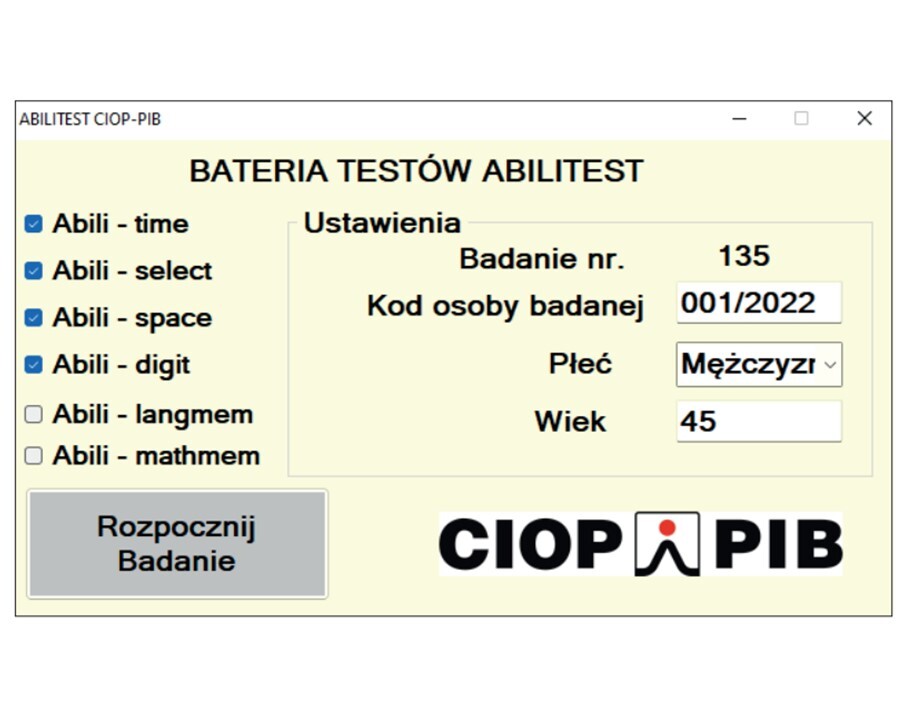Online first
Current issue
Archive
Most cited in 2023
Most cited in July 2022
Most cited in August 2022
Most cited in December 2022
About the Journal
Editorial Office
Editorial Board
Copyright and self-archiving policy
Information clause on the processing of personal data
Declaration of accessibility
Instructions for Authors
Instructions for Reviewers
Contact
Reviewers
2023
2022
2020
2021
2019
2018
2017
2016
2015
2014
2013
Editing and translations
ORIGINAL PAPER
Abilitest battery – psychometric properties: a preliminary study
1
Centralny Instytut Ochrony Pracy – Państwowy Instytut Badawczy / Central Institute for Labour Protection – National Research Institute, Warsaw, Poland (Pracownia Psychologii i Socjologii Pracy, Zakład Ergonomii / Laboratory of Social Psychology, Department of Ergonomics)
2
Centralny Instytut Ochrony Pracy – Państwowy Instytut Badawczy / Central Institute for Labour Protection – National Research Institute, Warsaw, Poland (Pracownia Przetwarzania Dźwięku, Zakład Zagrożeń Wibroakustycznych / Laboratory of Sound Processing, Department of Vibroacoustic Hazards)
Online publication date: 2023-05-10
Corresponding author
Sylwia Sumińska
Centralny Instytut Ochrony Pracy – Państwowy Instytut Badawczy, Pracownia Psychologii i Socjologii Pracy, Zakład Ergonomii, ul. Czerniakowska 16, 00-701 Warszawa
Centralny Instytut Ochrony Pracy – Państwowy Instytut Badawczy, Pracownia Psychologii i Socjologii Pracy, Zakład Ergonomii, ul. Czerniakowska 16, 00-701 Warszawa
Med Pr Work Health Saf. 2023;74(2):103-18
KEYWORDS
TOPICS
ABSTRACT
Background: Cognitive efficiency is crucial for many areas of human activity. It affects the employees’ efficiency and safety at the workplace. An important element of the prevention of accidents at work is the appropriate professional selection, which consists in checking the characteristics of candidates needed for a given position, and for this purpose, a psychological diagnosis is carried out. The aim of the study was to develop tools for cognitive diagnosis that are characterized by good psychometric properties. Material and Methods: Tools for the diagnosis of simple reaction time (Abili-time), choice reaction time (Abili-select), prolonged attention (Abili-space, Abili-digit), and working memory (Abili-langmem, Abili-mathmem) were developed. Validation studies were conducted with 221 individuals aged 20–60 to assess relevance and reliability (internal consistency and temporal stability), and with the participation of 61 in a retest 3 months after the first measurement. Paper tests (CTT, TUS, Digit Span from WAIS-R(PL)) and tests from the Vienna test system (RT, SIGNAL, CORSI, ALS) were used to assess validity. Results: The analysis showed that the Abili-time and Abili-select tests have satisfactory internal consistency. Analysis of temporal stability showed significant test-retest correlations for Abili-select, Abili-space, Abili-digit and Abili-langmem. Abili-time had slightly lower temporal stability. The temporal stability of Abili-mathmem was not confirmed. Significant correlations were obtained between the results of the developed tools with measures measuring similar constructs. Conclusions: The conducted research confirms the validity and reliability of Abili-time, Abili-select and Abili-space. Further work is needed on working memory tests, which are noteworthy due to the lack of other tools available on the market to test these functions. Further research should involve more people as well as carrying out standardization work. Med Pr. 2023;74(2):103–18
Share
RELATED ARTICLE
We process personal data collected when visiting the website. The function of obtaining information about users and their behavior is carried out by voluntarily entered information in forms and saving cookies in end devices. Data, including cookies, are used to provide services, improve the user experience and to analyze the traffic in accordance with the Privacy policy. Data are also collected and processed by Google Analytics tool (more).
You can change cookies settings in your browser. Restricted use of cookies in the browser configuration may affect some functionalities of the website.
You can change cookies settings in your browser. Restricted use of cookies in the browser configuration may affect some functionalities of the website.




